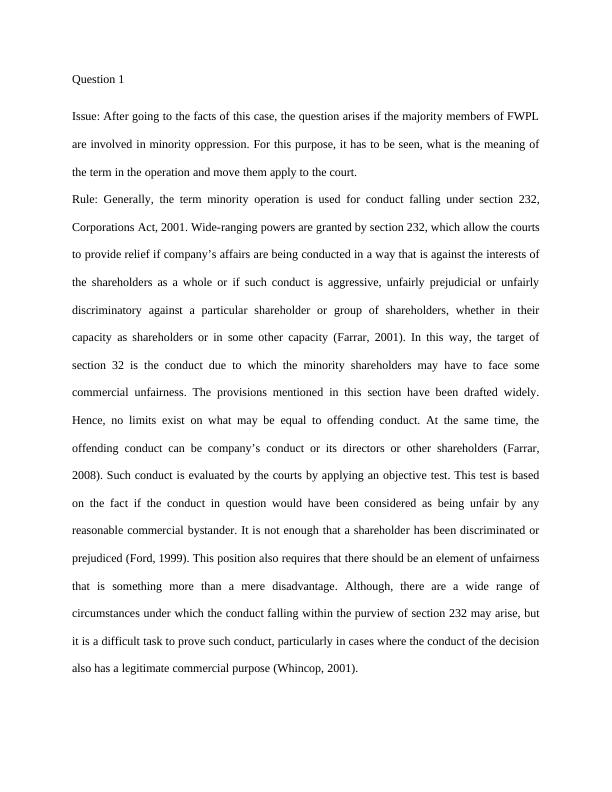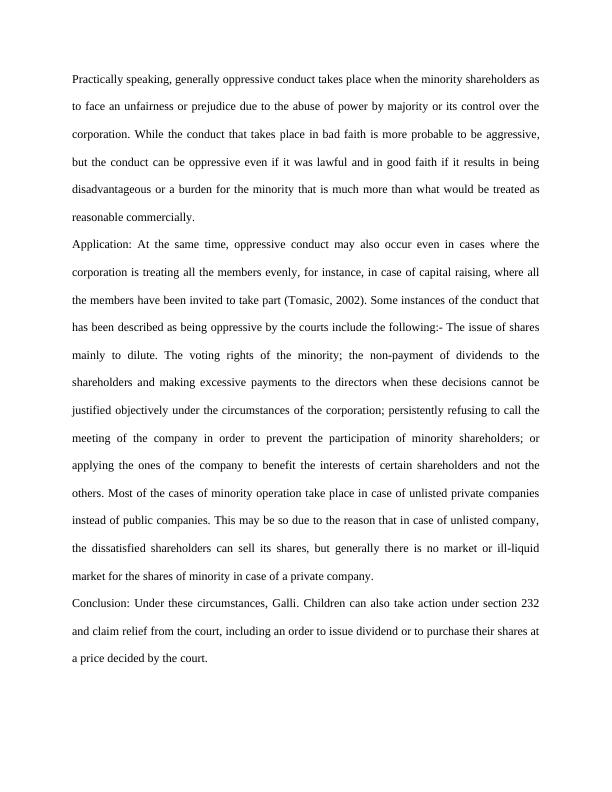A Case Study of Corporation Act 2001
Added on 2020-03-16
5 Pages1396 Words159 Views
Question 1Issue: After going to the facts of this case, the question arises if the majority members of FWPLare involved in minority oppression. For this purpose, it has to be seen, what is the meaning ofthe term in the operation and move them apply to the court. Rule: Generally, the term minority operation is used for conduct falling under section 232,Corporations Act, 2001. Wide-ranging powers are granted by section 232, which allow the courtsto provide relief if company’s affairs are being conducted in a way that is against the interests ofthe shareholders as a whole or if such conduct is aggressive, unfairly prejudicial or unfairlydiscriminatory against a particular shareholder or group of shareholders, whether in theircapacity as shareholders or in some other capacity (Farrar, 2001). In this way, the target ofsection 32 is the conduct due to which the minority shareholders may have to face somecommercial unfairness. The provisions mentioned in this section have been drafted widely.Hence, no limits exist on what may be equal to offending conduct. At the same time, theoffending conduct can be company’s conduct or its directors or other shareholders (Farrar,2008). Such conduct is evaluated by the courts by applying an objective test. This test is basedon the fact if the conduct in question would have been considered as being unfair by anyreasonable commercial bystander. It is not enough that a shareholder has been discriminated orprejudiced (Ford, 1999). This position also requires that there should be an element of unfairnessthat is something more than a mere disadvantage. Although, there are a wide range ofcircumstances under which the conduct falling within the purview of section 232 may arise, butit is a difficult task to prove such conduct, particularly in cases where the conduct of the decisionalso has a legitimate commercial purpose (Whincop, 2001).

Practically speaking, generally oppressive conduct takes place when the minority shareholders asto face an unfairness or prejudice due to the abuse of power by majority or its control over thecorporation. While the conduct that takes place in bad faith is more probable to be aggressive,but the conduct can be oppressive even if it was lawful and in good faith if it results in beingdisadvantageous or a burden for the minority that is much more than what would be treated asreasonable commercially. Application: At the same time, oppressive conduct may also occur even in cases where thecorporation is treating all the members evenly, for instance, in case of capital raising, where allthe members have been invited to take part (Tomasic, 2002). Some instances of the conduct thathas been described as being oppressive by the courts include the following:- The issue of sharesmainly to dilute. The voting rights of the minority; the non-payment of dividends to theshareholders and making excessive payments to the directors when these decisions cannot bejustified objectively under the circumstances of the corporation; persistently refusing to call themeeting of the company in order to prevent the participation of minority shareholders; orapplying the ones of the company to benefit the interests of certain shareholders and not theothers. Most of the cases of minority operation take place in case of unlisted private companiesinstead of public companies. This may be so due to the reason that in case of unlisted company,the dissatisfied shareholders can sell its shares, but generally there is no market or ill-liquidmarket for the shares of minority in case of a private company. Conclusion: Under these circumstances, Galli. Children can also take action under section 232and claim relief from the court, including an order to issue dividend or to purchase their shares ata price decided by the court.

End of preview
Want to access all the pages? Upload your documents or become a member.
Related Documents
Law Assignment - Corporations Act 2001lg...
|7
|1452
|147
Case Study: Pure Nature Sydney Pty Ltd [2018] NSWSC 914lg...
|5
|760
|56
Case Study: Pure Nature Sydney Pty Ltd [2018] NSWSC 914lg...
|5
|1094
|44
The case of the non-payment of the dividend by grandchildren of Gallilg...
|7
|1411
|387
Assignment on Corporations Lawlg...
|7
|1602
|70
Sam and Kate are the directors and shareholders of Fantasticlg...
|10
|2979
|180
